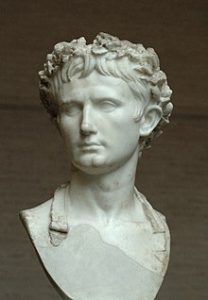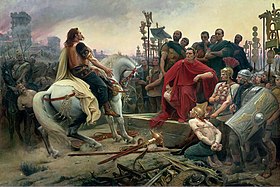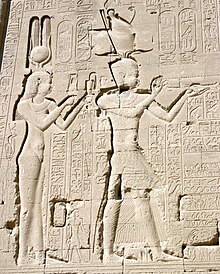Gaius Julius Caesar was a brilliant Roman commander known for both his military prowess and his charisma, which helped make his name a household name. He was a brave man and a seducer of women. One of the most well-known emperors to rule ancient Rome was Gaius Julius.
Early Life and Adolescence
Although historians cannot pinpoint Caesar’s exact birthdate, they largely agree that he was born in 100 BC. In most nations, historians adopt this date, at least that is what is used by most of them; but, in France, the prevailing consensus is that Julius was born in 101. Caesar was undoubtedly born in 102 BC, according to a German historian who lived in the early 19th century. However, modern historical literature does not adopt Theodor Mommsen’s claims.
Ancient primary sources are the root of these disputes among biographers concerning the years of life; for example, ancient Roman historians couldn’t agree on the exact date of Caesar’s birth.
The Roman commander was descended from the Julian aristocracy. According to legend, this dynasty started with Aeneas, who rose to fame in the Trojan War in Greek mythology. And Aeneas’ parents were the goddess of beauty and love, Aphrodite (Venus in Roman mythology), and Anchises, a descendant of the Dardanian rulers.
The Roman elite was aware of Julius’ heavenly origin tale since the ruler’s family had effectively propagated this legend. When the chance presented itself, Caesar himself loved to remember that there were gods in his family. According to scientific theories, the Roman emperor descended from the Julian line, who ruled during the first few centuries BC, when the Roman Republic was founded.
Divergent opinions exist among academics on the moniker Caesar. One of the Julian dynasties may have been born via Caesarean section. The term “royal” (caesarean) is whence the technique gets its name. Another legend holds that a member of a Roman family was born with long, disheveled hair, a trait known as caeserius.
The future politician’s family enjoyed a prosperous life. Caesar’s mother was descended from the aristocratic Cott family, while his father, Gaius Julius, held a position in the administration.
Despite coming from an affluent family, Caesar was raised in the Subura neighborhood of Rome. It was populated largely by impoverished people and was full of easy-going ladies. Historians from antiquity portray Subura as an impoverished, soggy neighborhood bereft of thinkers.
The kid learned philosophy, poetry, and oratory as well as developing physically and acquiring equestrianism, all thanks to the efforts of Caesar’s parents to provide their son with an outstanding education. Caesar learnt literature and manners from the learned Gaul Mark Antony Gniffon. Gaius Julius Caesar was educated in Rome; as a young boy, he had a strong sense of patriotism and refrained from being influenced by trendy Greek culture.
After his father passed away in 85 BC, Julius, the lone male, took on the role of primary provider.
Regulation
At the age of 13, the youngster who would become the commander was chosen to serve as a priest of Jupiter, the primary deity in Roman mythology. This position held significant power at the time. But this cannot be seen as the young man’s pure virtues because Julia, Caesar’s sister, was married to Marius, a prominent Roman politician from antiquity.
However, Julius had to marry by law in order to become a flamen. The military commander Cornelius Cinna, who offered the kid the position of a priest, selected Cornelia Cinilla, his own daughter, as Caesar.
Caesar was forced to leave Rome in 82 BC. This resulted from the installation of Lucius Cornelius Sulla Felix, who imposed a cruel and autocratic regime. Caesar disobeyed Sulla Felix’s orders to divorce his wife Cornelia, which infuriated the current commander. Additionally banished from Rome, Gaius Julius was a relative of Lucius Cornelius’ rival.
Along with losing his own belongings and the dowry from his wife, Caesar also lost his title of flamen. Julius, wearing shoddy clothing, was compelled to leave the republic.
Friends and family pleaded with Sulla to spare Julius, and as a result of their intervention, Caesar was allowed to return home. Furthermore, the commander declared that Caesar and Marius were the same and did not perceive any threat from Julius.
However, Gaius Julius Caesar fled to the Roman province of Asia Minor to study the art of warfare because life under Sulla Felix was intolerable for the Romans. He lived in Bithynia and Cilicia, formed friends with Marcus Minucius Thermus there, and took part in the battle against the Greek city of Methylene. As part of the city’s capture, Caesar rescued a soldier, for which he was granted the civic crown, also known as the oak wreath, the second-most significant honor.
Those who disapproved of Sulla’s policies tried to set up an uprising against the brutal tyrant in 78 BC. Marcus Aemilius Lepidus, a military commander and consul, was the instigator. Julius declined Marcus’ invitation for Caesar to join the uprising.
Caesar attempted to prosecute Gnaeus Cornelius Dolabella and Gaius Antonius Gabrida, two of Felix’s goons, following the Roman dictator’s death in 77 BC. Despite Julius’s impressive oratory when he stood before the judges, the Sullans were able to avoid punishment. Manuscripts containing Caesar’s accusations were circulated throughout ancient Rome. But Julius thought he needed to sharpen his oratory talents, so he traveled to Rhodes. Apollonius Molon, the rhetorician who trained Cicero, resided on the island.
Caesar was taken prisoner by local pirates en route to Rhodes, and they demanded a payment to release him. Despite being held captive, Julius joked and recited poems with the bandits instead of showing fear. Once freed from captivity, Julius organized a squadron and set out to apprehend the pirates. Caesar chose to have the robbers put to death since he could not get them to stand trial. Julius first gave the order to have them executed and then crucified on the cross so that the robbers would not suffer because of his kind nature.
Julius entered the upper college of priests in 73 BC; it was formerly headed by Gaius Aurelius Cotta, the brother of Caesar’s mother.
Caesar wed Pompeia in 68 BC. Pompeia was a relative of his friend and future fierce rival Gaius Julius Caesar, Gnaeus Pompeius. After two years, he was appointed Roman magistrate and started bringing festivals, celebrations of the city, and aid to the impoverished. In addition, he attended political intrigues after being appointed senator, which helped him become well-liked. In 49–44 BC, Caesar took part in the Leges frumentariae (“bread laws”), which allowed the populace to either receive free bread or buy it at a reduced cost. Julius implemented some changes.
Conflicts
The most well-known incident in both Gaius Julius Caesar’s biography and the history of Ancient Rome is the Gallic War.
At this point, Italy controlled the province of Narbonensis Gallia, which is now part of modern-day France, and Caesar was appointed proconsul. Since the German invasion had caused the Helvetians to begin migrating, Julius traveled to Geneva to talk with the chief of the Celtic tribe.
Caesar’s ability to speak effectively allowed him to convince the tribe’s leader not to enter Roman Republic territory. The Aedui, Rome’s allies, lived in Central Gaul, where the Helvetians moved instead. Caesar routed the Celtic tribe’s army while pursuing them. Concurrently, Julius routed the Germanic Suevi, who had invaded the Gallic regions bordering the Rhine River. He composed “Notes on the Gallic War,” an essay describing the conquest of Gaul, following the war.
After the Roman general routed the invading Germanic tribes in 55 BC, Caesar made the decision to travel across German territory.
Caesar was the first Roman general to launch a military expedition across the Rhine; Julius’s division traveled across a 400-meter bridge that was especially constructed for the purpose. His army left Germany quickly, though, and he made an attempt to advance into British territory. There, the commander achieved several decisive wins, but Caesar was compelled to flee since the Roman army’s situation was precarious. Moreover, Julius had to go back to Gaul in 54 BC to put an end to the rebellion because the Gauls outnumbered the Roman army but lost.
Caesar displayed both diplomatic and strategic abilities throughout the military operations; he was able to influence and create contradictions in the minds of the Gallic leaders.
The Dictatorship
Julius embraced his role as a dictator after seizing control of Rome. Caesar reorganized the Senate and altered the social structure. The dictator cut bread distribution and eliminated subsidies, which prevented the poorer classes from being forced to migrate to Rome.
In addition, Gaius Julius built two new structures: the Senate met in a Caesar-named edifice in Rome, and the Goddess Venus, the patroness of love and the Julian dynasty, had an idol erected in the city’s central plaza. Rome’s streets and temples were adorned with sculptures and images of Caesar. The Roman commander’s words were all regarded as law.
Individual life
Pompeia Sulla and Cornelia Cinilla were not the only ladies the Roman statesman had. Calpurnia Pisonis, a distant relative of Caesar’s mother, was a noble plebeian and Julius’ third wife. Political objectives account for the girl’s marriage to the commander in 59 BC; Calpurnia’s father was appointed consul following his daughter’s marriage.
More specifically, when it came to his personal life, Caesar was a promiscuous man who had extramarital affairs with women. Historians mentioned Julius Caesar’s early relationships with Nicomedes, as evidence of the allegations that he was bisexual and enjoyed sensual pleasures with men. Maybe the only reason these stories happened was to try and discredit Caesar.
When it comes to the well-known mistresses of the politician, Servilia, the second wife of consul Junius Silanus and wife of Marcus Junius Brutus, was one of the ladies who supported the military leader. Because of his indulgence in Servilia’s love, Caesar made an effort to grant her son Brutus’s wishes, making him one of the first people in Rome.
But Cleopatra, the Egyptian queen, is the dictator’s most well-known female figure. Caesar was over fifty years old when he met the 21-year-old monarch; his face was wrinkled and his bald head was covered with a laurel wreath. The youthful beauty was subjugated by the Roman commander, who, despite his advanced age, won her. Their joyful marriage lasted for two and a half years until Caesar’s assassination.
It is known that Julius Caesar had two children: Ptolemy Caesarion, a son born to Cleopatra, and Julia, a daughter from his first marriage.
Demise
On March 15, 44 BC, the Roman emperor passed away. The senators’ plot, motivated by their outrage about the dictator’s four-year reign, was the cause of death. Though there were fourteen participants in the conspiracy, Marcus Junius Brutus, Servilia’s son, is thought to have been the major one. Caesar placed Brutus in a powerful position and shielded him from hardships because he had unending love and trust for the young man. But for political reasons, the loyal republican Marcus Junius was prepared to murder the person who gave him unending support.
Since Servilia was having an affair with the commander at the time the future conspirator was conceived, some ancient historians theorized that Brutus was Caesar’s son. However, credible sources do not support this claim.
Legend has it that Calpurnia, Caesar’s wife, had a horrible dream the day before the conspiracy against him, but her husband was very gullible and acknowledged that he was a fatalist, believing that everything was predestined.
The Senate building, located next to Pompeii’s theater, served as a gathering place for the conspirators. The crooks determined that each would deal the dictator a single blow because none of them wanted to be the one to murder Julius.
